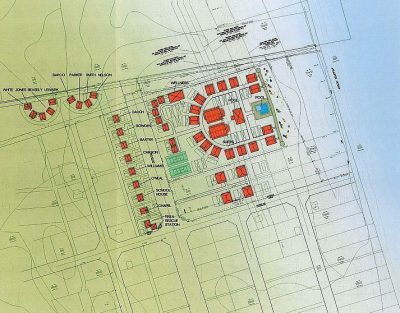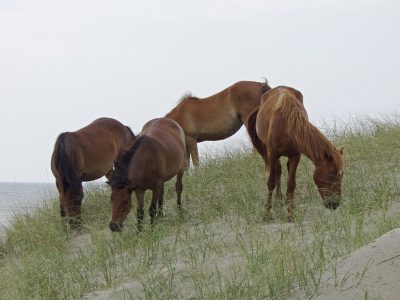CURRITUCK COUNTY – In 1973, author David Stick gave a speech in which he posed a question. “In our quest for growth and so-called progress, is it possible that we are gradually destroying the very things which make us love the Outer Banks and attracted us here in the first place?”
Best known as the author of “Graveyard of the Atlantic,” Stick was also a successful developer and real estate agent. Now, in the remote Carova area north of Corolla, the outcome of an ongoing legal battle could affect the balance between development and quality of life to which Stick referred.
Supporter Spotlight

This area is home for the Corolla wild horses, descendants of the Spanish mustangs brought to the New World in the 16th century. There are no paved roads in Carova and the only access is by way of the beach. The first two miles of the trip pass through the Currituck Banks Estuarine Reserve, a state- and federally managed reserve where paved roads aren’t allowed. Off the beach, the inner dune area is interspersed with narrow sand roads that are suitable for four-wheel-drive vehicles only. Although traffic has been increasing, the lack of infrastructure and paved roads has kept visitation modest by comparison to other parts of the Outer Banks.
Currituck County officials have long said they want development in the Carova area limited to residential, and zoning restrictions were enacted accordingly.
The Friedman family, the property owners and plaintiffs in the case against the county, and the companies in which members of the family are principals, including Swan Beach Corolla LLC and others, have tried unsuccessfully for years to develop their land for commercial use. Charles “Chip” Friedman, Gerald Friedman and Nancy Friedman say they have a vested right to build on their land and maintain that they have acted in good faith in their dealings with the county going back decades.

“The Friedmans look forward to moving on with the development of their property as they have long sought …” said Mitch Armbruster, the Friedmans’ attorney.
The Friedmans, originally of New Jersey, bought large swaths of land on Currituck Banks in the 1960s, including a 36-acre parcel in the Carova Beach area planned for “business lots,” according to court documents. The Friedmans say that since 1969, there have been discussions and an understanding with county officials that the family would build on the property when the population here became large enough to support commercial development.
Supporter Spotlight
Based on these verbal communications with the county, the Friedmans spent hundreds of thousands of dollars to have engineering studies done related to their development plans. Discussions with the county continued over the years, the Friedmans maintain, even as zoning laws were changed.
In 1989, Currituck County enacted a unified development ordinance, with zoning that essentially allowed only residential development in the Carova area and specifically prohibited large-scale commercial construction. This zoning is still in effect.

Around 2004, the Friedmans sought to move forward with development of their business lots, with plans for a convenience store, real estate offices, a post office and other uses, including a restaurant and a 300-unit lodge, but county officials noted that the plans would not be allowed under the zoning in place.
The Friedmans’ attorney in 2006 informed the county that the owners had vested rights, constitutionally protected rights that exist regardless of any zoning regulations. But rather than proceed with a legal fight, the family sought to resolve the dispute by way of a proposed commercial overlay district. County commissioners denied this request in 2008.
Then in 2010, the Friedmans submitted plans for a 294-room inn with an adjacent retail development. Carova residents expressed opposition to the plan during hearings for the project, and the county planning board, citing incompatible land use, an influx of visitors that could overwhelm services and possible damage to protected lands that are immediately adjacent to the property, voted unanimously to reject the Friedmans’ plan.
Verbal Agreements
The Friedmans in 2012 sued the county and its board of commissioners. The Friedmans again claimed they had vested interest that was based on their discussions with county officials during the previous 40-45 years and because they had paid for the engineering studies. They also claimed discrimination based on their Jewish faith and because they do not live in the county.
In April 2016, a judge issued a default judgment of more than 39.1 million against the county in the case, known as Swan Beach Corolla LLC vs. Currituck County. Judge Milton F. Fitch Jr. cited a failure on the part of county officials to file appropriate documents in a timely manner but did not address the issues of vested rights or discrimination.
The county failed in December 2016 to have the judgment overturned, and the case is now before the state appellate court, although no date has been set.
Ike McRee, the county attorney, said the verbal communications the Friedmans cite in the case are not sufficient. “A verbal assurance is not something someone can use to make a legal argument,” McRee said.
Armbruster, the Friedmans’ attorney, disagrees.
“Their property was platted and approved for development before zoning was in place in the four-wheel-drive area …” Armbruster said.
Ben Woody, the county planner, explained that creating a plat does not mean that a permit for has been issued. Woody said no approval was ever issued for the Friedmans’ 36 acres.
“On the plats, it says ‘business blocks,’ but they never got any permits,” Woody said.
Can it Be Built?
Aside from the legal issues, many say commercial development is not possible in Carova. One reason cited is that the area is a designated Coastal Barrier Resources Act, or CBRA, zone. Enacted in 1982, the act was passed to address problems with development in sensitive coastal areas. Designated CBRA zones are ineligible for federal expenditures or financial assistance for utilities, such as electricity, water and sewer, and roads, which could encourage development in ecologically sensitive areas.
“It is the opinion of the Planning Department that the project as proposed in the lawsuit is most likely unbuildable,” Woody, the county planner, wrote in an email. “It is proposed at a density more similar to that of an urban center. Beyond the fact there is no public infrastructure to support this scale of proposed development, it doesn’t appear to incorporate any elements of environmental stewardship. Considering the uniqueness and fragile nature of the off-road area, the development proposed in the Friedman lawsuit is out of scale and not appropriate.”
Woody said the county had never developed commercial standards for the Carova area because it has been classified as residential since it was first zoned for development.
County officials are also worried that the project, if allowed, could be the first of many large-scale developments here.
“The county’s longstanding policy position for the off-road area is to not allow commercial development or the expansion of infrastructure that may have the effect of inducing new development,” Woody wrote.
What’s at Risk?
Environmental consultant George Wood has been working with Outer Banks contractors for years, and he knows the Carova area.

“Environmentally speaking, these large structures bring more and more people to that area and more people demand more services,” he said. “And they impact the natural biology that is there by virtue of the fact that they’re there: tromping over the dunes, scaring the heck out of the horses and impacting all the way down the biological chain.”
Wood is not, however, opposed to all development in sensitive areas. He said it’s important to understand the surrounding environment and how development will affect it.
“It doesn’t have to be yes or no. It just has to be well-thought out,” he said. “When you develop on someplace like a barrier island, you have to adopt a different approach that recognizes the nature of the area that you’re building on.”
The Friedmans’ 36 acres are part of the Corolla wild horses’ range.
The Corolla Wild Horse Fund has managed the Corolla herd for years and, until recently, Karen McCalpin was the organization’s director. McCalpin retired in December 2016 after 10 years. To her, the Friedmans’ proposed development would lead to the destruction of a piece of living history.
“It would be devastating to the herd. I don’t know if they could survive this,” McCalpin said.







